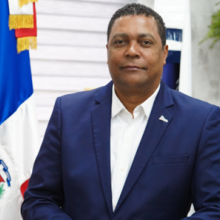
Mr. D’Aza has extensive experience in municipal politics at both the national and international levels, giving him the knowledge and leadership skills to propose, introduce, and drive the changes needed by Dominican municipalities and their entities to lead development processes in the territory.
Elected Mayor of the municipality of Villa González for the period 1998-2002, he implemented the country's first participatory municipal budget, before it was included in the legal framework and subsequently enshrined in the Constitution reformed in 2010.
He was executive director of the Dominican Federation of Municipalities (Fedomu) for 11 years, a position in which he contributed to the approval of Law 176-07 on the National District and Municipalities, Law 170-07 on Participatory Budgeting, and Law 166-03, which allocates 10 per cent of national budget revenue to municipalities. During Víctor D'Aza's tenure at Fedomu, the Dominican Republic ranked as the country in the region with the highest level of trust in municipal governments according to the Americas Barometer, with an average of 63.7.
In 2016, he was elected deputy for the province of Santiago and was directly involved in the discussion and approval of the Law on Political Parties and Groups, as well as in the reform of the Electoral Regime Law.
He is a member of the National Directorate of the Modern Revolutionary Party (PRM) and was executive director of Luis Abinader's Presidential Cabinet during the 2020 election campaign.
President Abinader appointed him Deputy Minister of Inter-institutional Relations and Relations with the Powers of the State of the Administrative Ministry of the Presidency, and subsequently, the National Assembly of Municipalities unanimously elected him president of the Dominican Municipal League.
He holds a law degree from the Technological University of Santiago (UTESA) and a Master in Urban Planning and Municipal Management from the Pontifical Catholic University Madre y Maestra (PUCMM), along with extensive complementary training in local development.

